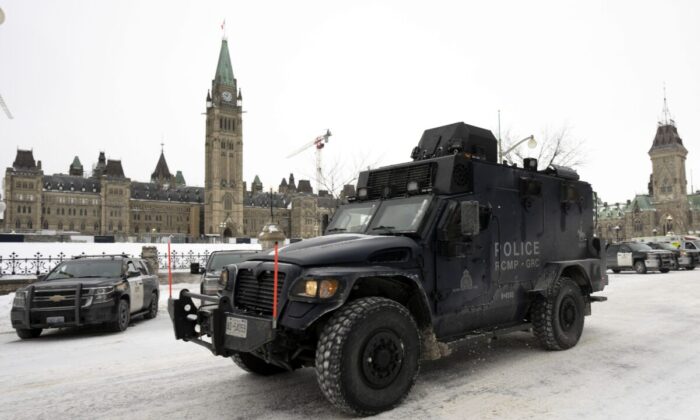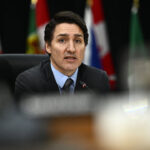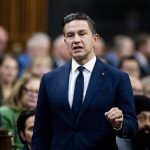Lawyers from advocacy groups and provinces argued in court that Ottawa did not meet the legal threshold for invoking the Emergencies Act in response to the 2022 convoy protests, on the second day of the attorney general’s appeal of a judge’s 2024 decision that came to the same conclusion.
On Jan. 23, 2024, Justice Richard Mosley ruled that by invoking the act in response to the trucker protest against COVID-19 mandates in February 2022, the Liberal government had acted unreasonably and interfered with Canadians’ Charter rights. Mosley said that Charter rights outlined in Section 2(b), which deals with freedom of thought, belief, opinion, and expression, and Section 8, which deals with the right to be secured from unreasonable seizure, had been violated.
Mosley’s ruling came nearly a year after a public inquiry determined that the government had met the “very high” threshold to invoke the act. Ontario Court of Appeal Justice Paul Rouleau, who acted as commissioner of the Public Order Emergency Commission, said the government had “reasonable grounds to believe” there was a national emergency arising from threats to the security of Canada that necessitated the special action.
Speaking in front of three Federal Court of Appeal justices on Feb. 5, Canadian Civil Liberties Association lawyer Ewa Krajewska said the government’s explanation did not satisfy the legal thresholds required to invoke the Emergencies Act. She also said that the previous day, lawyers representing the government of Canada had argued that the legal thresholds for the act should have been applied to a more flexible standard than the law.
Government lawyer Michael Feder had argued a day before that Mosley used his own findings and relied less on the government’s justifications for its decisions at the time when making his determination, which meant using “20/20 hindsight” instead of the facts known as the time. He noted that the Emergencies Act can be invoked at the government’s discretion, as long as it has “compelling and credible information to ground the belief” that it is warranted, and a cache of weapons and ammunition found in Coutts, Alta., during the protest was an adequate justification.
Krajewska said the government needed to have evidence on reasonable and probable grounds to support the invocation of the act, but the government’s explanation did not contain this. She said while the act can be invoked if there exists a threat to the security of Canada so serious that it constitutes a national emergency, which is defined in the CSIS Act, the government did not have this assessment.
She also said while the proclamation mentioned economic harm done by protests at Canada–U.S. border crossings, this did not rise to the level of causing “serious violence to property,” since most of the crossings had been reopened before the act was invoked. Mosley had also determined that he had been unable to find the term “serious violence to property” encompassed “the type of economic disruption that resulted from the border crossing blockades, troubling as they were.”
Alberta and Saskatchewan Against Ottawa’s Use of Act
Lawyers from the provinces of Alberta and Saskatchewan also told the judges that the government’s invocation of the Emergencies Act was unreasonable. Mandy England, a lawyer appearing for the attorney general of Alberta, said the act could not be interpreted in a broad way that would defeat the “carefully tailored system of checks and constraints,” and allow the government to take over areas of provincial jurisdiction.
England argued that the situation in Coutts had been resolved before the act was brought in, and the province was within its capacity to deal with the issue using existing laws. She also said while Ottawa claimed the province’s Critical Infrastructure Defence Act was too limited in scope compared to federal emergency regulations, it covered a wide range of infrastructure that included highways and railways.
“The question that must be answered is whether these interpretations of the legislation and the tests—that affect the rights and interests of the provinces so profoundly—were reasonable under the act, given all the legal and factual constraints,” England said.
A lawyer representing Saskatchewan said it was unreasonable for the government to see the situation as a national emergency, since several roadblocks had been cleared using existing tools and seven out of the 10 provinces had said the Emergencies Act was not needed.
Additionally, while the government had said the Bill of Rights did not apply because the order was an exercise in law-making and the bill only applies to administrative decisions, the Saskatchewan lawyer argued this was not the case. He said the Bill of Rights states that “no one shall be deprived of their enjoyment of property without due process of law,” but the government had frozen many protesters’ bank accounts without providing for procedural fairness.
“The Governor in Council’s actions were subject to the Bill of Rights, and the Bill of Rights has to mean something. In this case, not even the most basic and minimal procedural protection was accorded. We say that infringes the Bill of Rights,” he said.
Government lawyers told the court the previous day that the protests were a form of “coercion akin to violent expression,” and therefore were not protected under the Constitution.
John Provart, representing the federal government, also said the economic measures against protesters’ bank accounts did not constitute an unreasonable search and seizure, arguing that Section 8 of the Charter protects privacy and not property, and the measures applied to provisions outside of constitutional protection.











